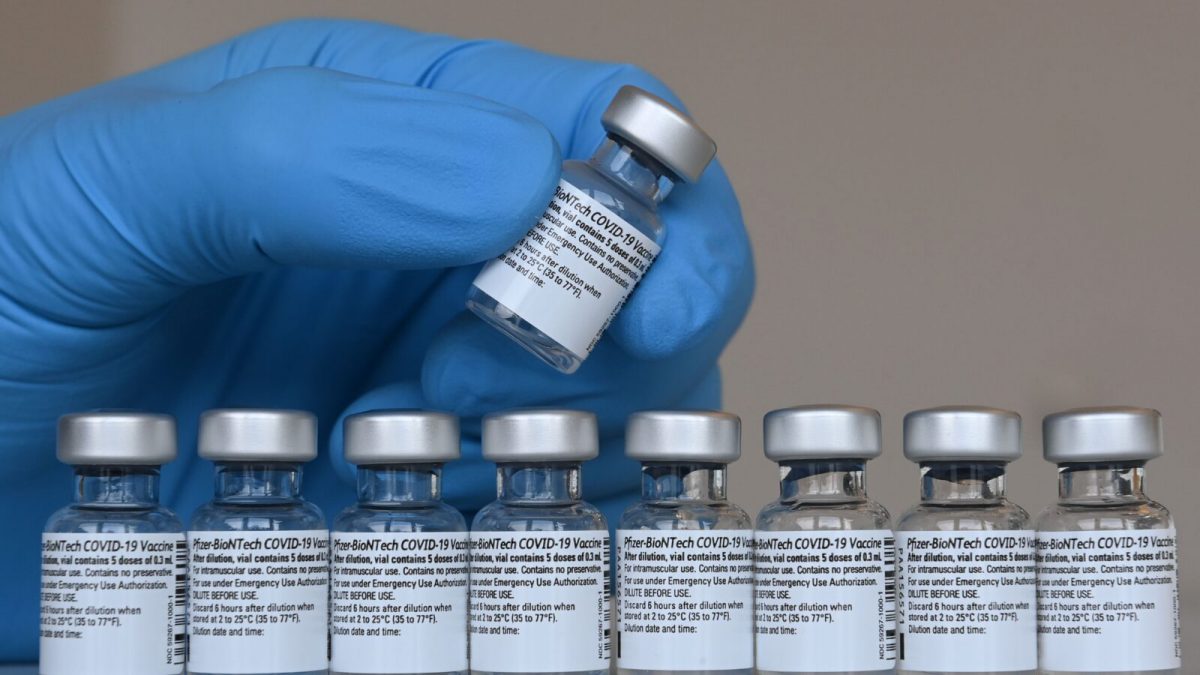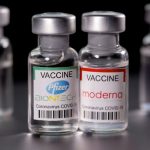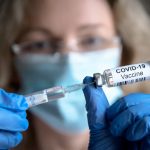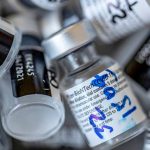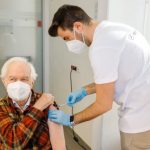Pfizer’s COVID Vaccine
The Food and Drug Administration has formally approved Pfizer‘s COVID-19 vaccine.
The widely anticipated decision replaces the emergency use authorization granted by the agency last December.
This is the first COVID-19 vaccine to be subject to a full review by the U.S. regulator and to get an approval that puts the vaccine on par with other marketed vaccines.
The full approval could make it easier for employers, the military and universities to mandate vaccination and may reassure some people who are hesitant about the vaccine.
“While this and other vaccines have met the FDA‘s rigorous, scientific standards for emergency use authorization, as the first FDA-approved COVID-19 vaccine, the public can be very confident that this vaccine meets the high standards for safety, effectiveness, and manufacturing quality the FDA requires of an approved product,” acting FDA Commissioner Janet Woodcock said in a statement.
Approval could lead to more vaccinations
A June poll from the Kaiser Family Foundation found that 31% of unvaccinated people said they would be more likely to get a COVID-19 vaccine once one receives full approval from the FDA.
“While millions of people have already safely received COVID-19 vaccines, we recognize that for some, the FDA approval of a vaccine may now instill additional confidence to get vaccinated,” Woodcock said. “Today’s milestone puts us one step closer to altering the course of this pandemic in the U.S.”
The FDA’s full approval applies to people 16 and older. Those between ages 12 and 15 can still receive the vaccine under the existing emergency use authorization.
There is no timeline for children under 12
That authorization does not extend to children under the age of 12. FDA officials have acknowledged the interest in vaccination for children in that age group, but were unable Monday to provide a timeline for a decision on use of the vaccine for those under 12.
“Currently there are still trials ongoing here,” Dr. Peter Marks, director of FDA’s Center for Biologics Evaluation and Research, told reporters. “The agency has to wait for the companies to submit. … Obviously, we will move swiftly, but first the trials have to be finished … and the data need to be submitted to us.”
The FDA acted Monday without convening a customary public meeting of expert advisers to vet information about the vaccine and make recommendations to the regulator.
As of Sunday, 73% of adults have had at least one dose of the Pfizer, Moderna or Johnson & Johnson vaccine.
Pfizer’s vaccine is most commonly administered, accounting for about 56% of the doses administered overall, according to data from the Centers for Disease Control and Prevention.
Moderna’s COVID-19 vaccine remains under the FDA’s review, but its approval is expected to follow in the near future.
also read :
- Schools Reopen to Mask Confusion ? CDC mask mandate
- CDC : Delta variant fueling increased Covid-19 infections
FDA grants full approval to Covid-19 vaccine developed by Pfizer, BioNTech
The Food and Drug Administration on Monday granted full approval to the Covid-19 vaccine developed by Pfizer and its partner BioNTech, a long-awaited development that public health officials hope will persuade some people who remain hesitant about the vaccine to get the shot.
The vaccine is the first of the pandemic vaccines used in the United States to transition from emergency use status to full licensure, a major victory for a partnership that decided to forgo funding through the government’s Operation Warp Speed program on the belief that the development project could move faster without being part of the government fast-tracking program.
The FDA said the vaccine was now approved for use in people ages 16 and up, the only group for which Pfizer now has the required six months of followup safety data. Study of the vaccine in 12- to 15-year-olds began later, and the six-month followup is still underway. Until it can be submitted to the FDA and an extension of the license can be issued, the vaccine will continue to be used in 12- to 15-year-olds under the emergency use authorization.
Pfizer and BioNTech are still conducting a clinical trial to support the vaccine’s use in children 11 and younger.
“While millions of people have already safely received COVID-19 vaccines, we recognize that for some, the FDA approval of a vaccine may now instill additional confidence to get vaccinated,” acting FDA Commissioner Janet Woodcock said in a statement. “Today’s milestone puts us one step closer to altering the course of this pandemic in the U.S.”
The FDA’s prescribing information for the vaccine includes its associated risk of myocarditis and pericarditis, two types of heart inflammation that have appeared rarely among people who’ve received the mRNA vaccines, mostly within seven days after the second shot, health officials said. Men under 40 appear to be at higher risk than women and older men, with the highest observed risk in boys age 12 to 17.
Health officials have said most cases of myocarditis and pericarditis reported so far after people received the vaccines have been mild. “Available data from short-term follow up suggests that most individuals’ symptoms have now resolved,” Peter Marks, the director of FDA’s Center for Biologics Evaluation and Research, said Monday on a call with reporters.
Meantime, U.S. health officials have said they plan to recommend a third dose of the vaccine as a booster shot, pending FDA approval, given some evidence that protection appears to wane over time. (A booster shot will also be recommended for people who received Moderna’s vaccine.) That recommendation, issued last week, swiftly drew concern from some experts, who said they believe the data aren’t strong enough to suggest an additional dose of vaccine is necessary.
Pfizer’s vaccine is sold under the brand name Comirnaty. Since it was first put into emergency use — in the United Kingdom last December — the vaccine has been given to hundreds of millions of people around the world. A handful of countries have already granted the vaccine a license and roughly 70 others have given it emergency use status.
To date, Pfizer and BioNTech have made 1.2 billion doses of vaccine. By the end of the year, that figure is expected to rise to 3 billion doses; in 2022 the companies project they will produce 4 billion doses. The U.S. government has purchased 1 billion doses of the vaccine — half for use in this country and half to donate to low-income countries.
Monday’s approval “affirms the efficacy and safety profile of our vaccine at a time when it is urgently needed,” Pfizer CEO Albert Bourla said in a statement. “I am hopeful this approval will help increase confidence in our vaccine, as vaccination remains the best tool we have to help protect lives and achieve herd immunity.”
The FDA has been under intense pressure to fast-track full approval of the vaccine, given that some people who remain unvaccinated have cited the emergency use authorization as the reason for their reluctance to get the jab. Approval was also expected to make it easier for some public and private organizations and require vaccination.
By law, the FDA had to rule on the application no later than eight months from the date when the final documents were submitted — May 21. But in the face of the political pressure to process the application well before the Jan. 21, 2022, deadline, the agency committed publicly to pull out all the stops to get the job done.
The application was based on a study of 44,000 people, half of whom were given two doses of the Pfizer vaccine. The other half received saline. Based on the six months of followup, the vaccine’s efficacy in preventing symptomatic Covid infection was 91.1%.
Physicians can generally prescribe approved products “off-label,” leading to speculation that some doctors will now prescribe the Pfizer vaccine to children under 12, particularly with school starting. But Woodcock said such a practice “would be of great concern,” noting that clinical trials in kids are still producing data on the shots’ safety in kids and on the proper dose for younger children.
“We need to get the information and data on uses in younger children,” Woodcock said on a call with reporters. “They are not just small adults, and we’ve learned that time and time again.”
Marks said the FDA understood the great interest in when it would authorize vaccines for younger children, but that the agency was still waiting on the companies to submit more data from their trials in kids.
“We will obviously move swiftly once those data are submitted,” Marks said.
The F.D.A. grants full approval to the Pfizer-BioNTech Covid-19 vaccine.
The Food and Drug Administration on Monday granted full approval to Pfizer-BioNTech’s coronavirus vaccine for people 16 and older, making it the first to move beyond emergency use status in the United States.
The decision will set off a cascade of vaccine requirements by hospitals, colleges, corporations and other organizations. Defense Secretary Lloyd J. Austin III will be sending guidelines to the country’s 1.4 million active duty service members mandating that they be vaccinated, the Pentagon announced on Monday.
United Airlines recently announced that its employees will be required to show proof of vaccination within five weeks of regulatory approval.
Oregon has adopted a similar requirement for all state workers, as have a host of universities in states from Louisiana to Minnesota. In New York, the F.D.A.’s approval also brought into force a requirement announced in May that all students attending in-person classes at State University of New York and City University of New York schools be vaccinated.
The approval comes as the nation’s fight against the pandemic has intensified again, with the highly infectious Delta variant dramatically slowing the progress that the country had made over the first half of the year. The Biden administration hopes the development will motivate at least some of the roughly 85 million unvaccinated Americans who are eligible for shots to get them.
President Biden is planning to commemorate it in a speech urging vaccination scheduled for 1:30 p.m. Eastern time on Monday afternoon. “If you’re not vaccinated yet, now is the time,” the president said on Twitter.
“While millions of people have already safely received Covid-19 vaccines, we recognize that for some, the F.D.A. approval of a vaccine may now instill additional confidence to get vaccinated,” Dr. Janet Woodcock, the acting F.D.A. commissioner, said in a statement. “Today’s milestone puts us one step closer to altering the course of this pandemic in the U.S.”
Pfizer said it presented the F.D.A. with data from 44,000 clinical trial participants in United States, the European Union, Turkey, South Africa and South America. The company said the data showed the vaccine was 91 percent effective in preventing infection — a slight drop from the 95 percent efficacy rate that the data showed when the F.D.A. decided to authorize the vaccine for emergency use in December. Pfizer said the decrease reflected the fact that researchers had more time to catch people who became infected.
A recent poll by the Kaiser Family Foundation, which has been tracking public attitudes during the pandemic, found that three of every 10 unvaccinated people said that they would be more likely to get vaccinated with a shot that had been fully approved.
Editors’ Picks
On the Move With Mongolia’s Nomadic Reindeer Herders
Tiffany Haddish Would Like to Share Some Facts About Shark Sex
Gambling on Trevor Bauer Is Not the Dodger Way
But the pollsters and other experts warned that percentage could be exaggerated. “I think that is a vanishingly small number of people in real life, ” said Alison Buttenheim, an associate professor of nursing at the University of Pennsylvania and expert on vaccine hesitancy.
More important, Dr. Buttenheim said, would be the effect of requirements. “Mandates simplify things for people,” she said.
The regulatory action gives doctors more leeway to prescribe a third shot of the Pfizer vaccine to patients, but federal officials strongly discouraged people from seeking extra shots until regulators decide they are safe and effective. Pending regulatory clearance, the federal government plans to start offering booster shots for adults next month.
The vaccine will continue to be authorized for emergency use for children ages 12 to 15 while Pfizer collects the necessary data required for full approval. A decision on whether to authorize the vaccine for children younger than 12 could be at least several months away, and Dr. Woodcock said no child that age should be given any Covid-19 vaccine because regulators lack safety data.
So far, more than 92 million Americans — 54 percent of those fully inoculated — have gotten Pfizer shots. Most of the rest received Moderna’s vaccine.
Dr. Peter Marks, the F.D.A.’s top vaccine regulator, said that the Pfizer vaccine’s licensure followed a rigorous review of hundreds of thousands of pages of data and included inspections of the factories where the vaccine is produced. “The public and medical community can be confident that although we approved this vaccine expeditiously, it was fully in keeping with our existing high standards for vaccines in the U.S.,” he said.
He said that federal health agencies would continue to monitor the vaccine’s safety and that the F.D.A. would require Pfizer to continue to study the risks of myocarditis, an inflammation of the heart muscle, and pericarditis, an inflammation of the membrane surrounding the heart, including the long-term outcomes for recipients. The F.D.A. in June attached warnings to the Pfizer-BioNTech and Moderna vaccines noting possible increased risk of those conditions after the second dose.
Although Pfizer is now free to market the drug under the name Comirnaty, the company said only the federal government will distribute doses in the United States.
Health experts and state officials welcomed the development. With the Delta variant driving up caseloads across the country, “full approval could not come at a more important time,” said Dr. Richard Besser, president of the Robert Wood Johnson Foundation and former acting director of the Centers for Disease Control and Prevention. He called on schools and businesses to require vaccination before allowing people to congregate indoors.
Less than two months after it appeared to have curbed the spread of the virus, United States is now averaging around 150,000 new cases a day and more than 90,000 hospitalized Covid-19 patients. An average of about 1,000 a day are dying of Covid-19 — a toll that federal health experts recently dismissed as highly unlikely, before the Delta variant fully took hold. Many children under 12 are also becoming infected.
Vaccination rates have also rising in recent weeks, in part because of more fear of the virus. Providers were administering about 837,000 shots a day, a substantial jump from earlier this summer.
Some experts have estimated that full approval might convince just five percent of those who are unvaccinated to get shots. Even if that’s so, “that’s still a huge slice of people,” Dr. Thomas Dobbs, the chief health officer for Mississippi, a state that is particularly hard hit by the Delta variant. He said licensure will help “shake loose this false assertion that the vaccines are an ‘experimental’ thing.”
Dr. Marks, the vaccine regulator, cited a series of other myths about the vaccines as a major impediment to fighting the pandemic, including false claims that the shots would cause infertility, foster rather than prevent Covid disease or had led to thousands of deaths. “Let me be clear. These claims are simply not true,” he said.
The F.D.A. is in the midst of a decision-making marathon related to coronavirus vaccines. The next major one looming for regulators is whether or not to authorize booster shots. The Biden administration said last week it plans to offer third shots to adults who got the Pfizer and Moderna vaccines eight months after their second injection, starting Sept. 20. Third shots are already authorized for some people with immune deficiencies, but the risk-benefit calculus is different for the general population.
Federal health officials said that both Pfizer-BioNTech and Moderna’s vaccines, which rely on similar technology, wane in potency over time. That trend, they said, is converging with the rise of the particularly dangerous Delta variant, making those who completed their vaccinations at the start of the year increasingly vulnerable to infection.
Some health experts have challenged the decision to recommend booster shots as premature, saying the data shows that the vaccines are holding up well against severe disease and hospitalization, including against the Delta variant. Boosters would only be warranted if the vaccines were failing to prevent hospitalizations with Covid-19, some of those experts have said.
Regulators are still reviewing Moderna’s application for full approval of its vaccine. That decision could take several weeks. Johnson & Johnson is expected to apply soon for full approval.
Pfizer–BioNTech COVID-19 vaccine
The Pfizer–BioNTech COVID-19 vaccine (INN: tozinameran), sold under the brand name Comirnaty, is an mRNA-based COVID-19 vaccine developed by the German biotechnology company BioNTech.
It is authorized for use in people aged twelve years and older in some jurisdictions and for people sixteen years and older in other jurisdictions, to provide protection against COVID-19, caused by infection with the SARS-CoV-2 virus.
For its development BioNTech collaborated with Pfizer, an American company, for support with clinical trials, logistics, and manufacturing.
The vaccine is given by intramuscular injection. It is composed of nucleoside-modified mRNA (modRNA) encoding a mutated form of the full-length spike protein of SARS-CoV-2, which is encapsulated in lipid nanoparticles.
Initial advice indicated that vaccination required two doses given 21 days apart, but the interval was later extended to up to 42 days in the US, and up to four months in Canada.
Clinical trials began in April 2020; by November 2020, the vaccine entered Phase III clinical trials, with over 40,000 people participating.
An interim analysis of study data showed a potential efficacy of 91.3% in preventing symptomatic infection within seven days of a second dose.
The most common side effects include mild to moderate pain at the injection site, fatigue, and headaches. Reports of serious side effects, such as allergic reactions, are very rare;[citation needed] no long-term complications have been reported. Monitoring of the primary outcomes from the trials will continue until August 2021, while monitoring of the secondary outcomes will continue until January 2023. As part of the updates for the Phase III clinical trials posted in June 2021, the assessment of biostability will be studied to further describe the potential protection given by the vaccine against emerging SARS-CoV-2 Variants of Concern.
The vaccine is the first COVID‑19 vaccine to be authorized by a stringent regulatory authority for emergency use and the first cleared for regular use. In December 2020, the United Kingdom was the first country to authorize its use on an emergency basis. It is authorized for use at some level in the majority of countries. On August 23, 2021, the Pfizer–BioNTech vaccine became the first COVID vaccine to be fully licensed in the United States.
As of 30 March 2021, Pfizer and BioNTech aimed to manufacture about 2.5 billion doses in 2021.
Distribution and storage is a logistical challenge because the vaccine needs to be stored at extremely low temperatures. BioNTech and Pfizer are testing a freeze-dried version that would not need ultracold storage.
